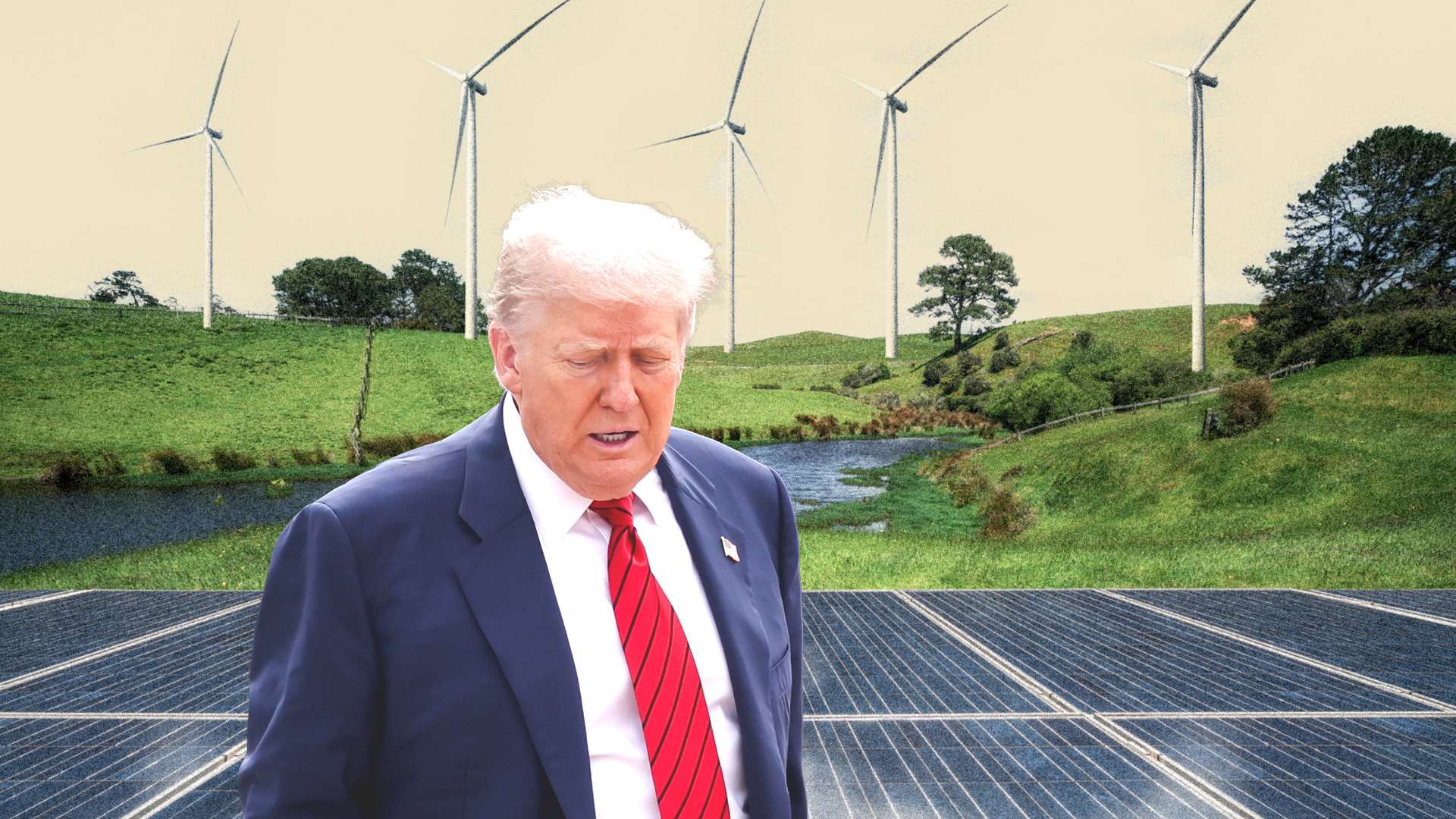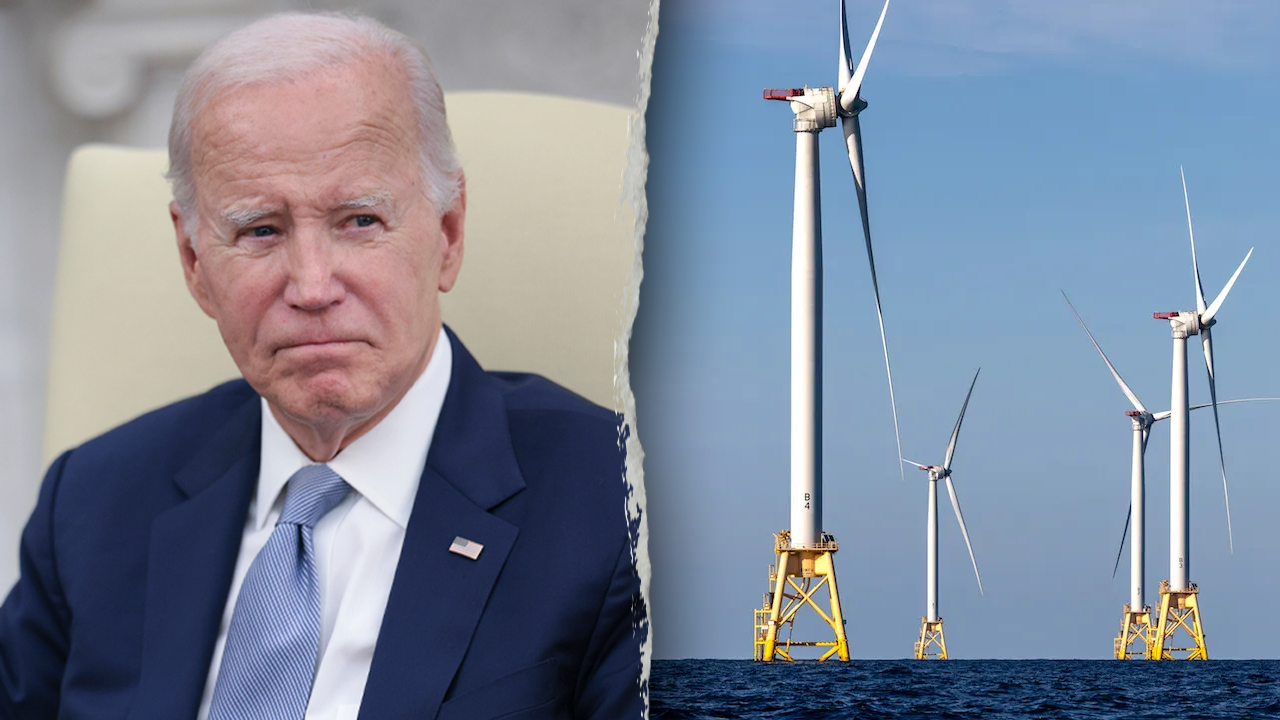
The Trump administration has ordered the immediate termination of a massive offshore wind project off the coast of Rhode Island and Connecticut, marking the latest move in President Donald Trump’s sweeping rollback of Biden-era energy initiatives.
The Department of the Interior (DOI), which oversees federal energy projects on public lands and waters, announced Friday that it is halting all activity on the Revolution Wind project, a flagship renewable energy initiative championed by the Biden administration.
The decision represents a dramatic reversal in federal energy policy, underscoring Trump’s promise to pivot away from wind and solar development in favor of oil, gas, and other traditional energy sources.
The Bureau of Ocean Energy Management (BOEM), an agency within the Department of the Interior, confirmed that work on Revolution Wind has ceased immediately. Aubrie Spady, deputy press secretary at DOI, framed the move as part of Trump’s broader “Energy Dominance Agenda.”
“Americans deserve energy that is affordable, reliable, and built to last — not experimental and expensive wind projects that are proven failures,” Spady said in a statement to the Daily Caller.
“In line with President Donald Trump’s Energy Dominance Agenda, Interior is putting an immediate stop to these costly failures to deliver a stronger energy future and lower costs for American families. Like President Trump said, ‘the days of stupidity are over in the USA!’”
Approved by the Biden administration in 2023, the Revolution Wind farm was designed to generate electricity for Rhode Island and Connecticut from turbines located on the federally owned Outer Continental Shelf.
Supporters hailed it as a milestone in the United States’ push to expand renewable energy capacity and reduce dependence on fossil fuels.

Environmental groups allied with the Biden White House praised the project for its potential to reduce carbon emissions and meet climate goals. However, opponents argued the costs outweighed the benefits, citing concerns about wildlife, marine ecosystems, and the economic reliability of offshore wind power.
President Trump signed an executive order on July 7 directing the Interior Department to review and revise regulations, policies, and guidance to eliminate what he called “preferential treatment” for wind and solar facilities.
The order instructed DOI to ensure federal policy no longer tilted toward renewable projects and instead promoted energy independence through oil, natural gas, and coal.
The executive order fulfilled a key campaign promise from Trump, who during the 2024 election pledged to dismantle President Joe Biden’s “Green New Deal” policies.
“Drill baby drill” has become a central slogan of Trump’s energy agenda, which he argues will drive down costs for consumers and reduce reliance on foreign components used in renewable technologies.
President Trump has long been a vocal critic of wind energy, calling wind farms unreliable, expensive, and environmentally harmful. In a post on his Truth Social account earlier this week, he attacked states that have invested heavily in renewable power.
“Any State that has built and relied on WINDMILLS and SOLAR for power are seeing RECORD BREAKING INCREASES IN ELECTRICITY AND ENERGY COSTS,” Trump wrote. “THE SCAM OF THE CENTURY! We will not approve wind or farmer destroying Solar. The days of stupidity are over in the USA!!!”
Trump has repeatedly pointed to studies and reports claiming that wind farms kill large numbers of birds, including bald and golden eagles, and disrupt marine life.
Interior Secretary Doug Burgum, a Republican former governor of North Dakota appointed to lead the DOI earlier this year, reiterated the administration’s position in a social media post.
“Wind projects are known to kill eagles, and climate extremists in the Biden admin still greenlit scores of these projects,” Burgum wrote on X. “[The DOI] is enforcing the Bald and Golden Eagle Protection Act to ensure that our national bird is not sacrificed for unreliable wind facilities!”
Burgum also highlighted growing evidence that offshore wind construction can disrupt whales and dolphins. Ironically, some environmental groups that typically align with Democratic causes have joined conservatives in opposing offshore wind projects over concerns about marine mammal deaths.
The shutdown of Revolution Wind follows a series of Trump administration actions against renewable energy projects. In March, DOI pulled the permit for a pending New Jersey offshore wind farm, effectively killing one of the largest proposed projects on the East Coast.
More recently, the administration moved to terminate the Lava Ridge Wind Project in southern Idaho, which had been approved during the final weeks of Biden’s presidency.
The Lava Ridge project, one of the largest proposed onshore wind farms in the United States, faced opposition from local ranchers, Native American tribes, and Republican state officials.
Together, these moves signal a comprehensive rollback of renewable energy priorities in favor of expanded oil, gas, and coal production — policies that Trump says will restore U.S. energy dominance.
Republican lawmakers praised the decision to halt Revolution Wind. Representative Jim Jordan of Ohio, chairman of the House Judiciary Committee, called it “a common-sense win for the American people.”
“Wind and solar have been nothing but subsidies and scams pushed by climate extremists,” Jordan said. “President Trump is keeping his word to put American families and jobs first.”
Senator Ted Cruz of Texas, a Republican and ranking member of the Senate Commerce Committee, said the Revolution Wind project “never should have been approved in the first place.” He argued that Biden administration officials “put ideology ahead of science and economics.”
Democrats, however, condemned the move as shortsighted and politically motivated. Senator Sheldon Whitehouse of Rhode Island, a Democrat and longtime advocate for renewable energy, blasted the cancellation.
“This is nothing more than a political vendetta against clean energy,” Whitehouse said. “The Revolution Wind project was going to provide clean, reliable power to hundreds of thousands of households in New England while creating thousands of jobs. Instead, Trump is dragging us backward.”
Connecticut Governor Ned Lamont, a Democrat, called the decision “a slap in the face to New England families who deserve affordable, renewable energy solutions.”
The renewable energy industry expressed alarm at the administration’s decision. Joe Rand, a senior researcher at Lawrence Berkeley National Laboratory, said the cancellation could send a chilling signal to investors.
“Offshore wind projects require long-term commitments from developers, financiers, and local governments,” Rand said. “If the federal government keeps reversing approvals, companies will think twice about investing billions of dollars in these projects.”
Trade associations, including the American Clean Power Association, warned that halting Revolution Wind could threaten thousands of jobs in manufacturing, construction, and maintenance across the East Coast.
Environmental groups offered mixed responses. Some organizations allied with the Democratic Party condemned the Trump administration for undermining climate goals.
“This decision is catastrophic for America’s fight against climate change,” said Sierra Club Executive Director Ben Jealous. “We need bold investments in renewable energy, not reckless rollbacks.”
But other environmental advocates, particularly local and marine-focused groups, applauded the move. The Save Right Whales Coalition, which opposes offshore wind farms, said the cancellation would help protect marine mammals.
“Offshore wind construction and operation have been linked to whale strandings and dolphin deaths,” the group said in a statement. “We are relieved to see this dangerous project stopped.”
The cancellation of Revolution Wind illustrates the stark divide between Trump and Biden energy policies. While President Biden prioritized rapid expansion of renewable power, including solar and offshore wind, President Trump is focused on maximizing fossil fuel production.
Biden officials had argued that projects like Revolution Wind were essential to meeting U.S. climate targets under international agreements. Trump and his allies counter that renewable energy is unreliable, expensive, and dependent on foreign supply chains, particularly China.
The clash underscores how energy policy in the United States has become deeply partisan, with each administration reshaping the industry through executive actions and regulatory changes.
For now, the Revolution Wind project is dead, and other offshore wind proposals face an uncertain future. Industry leaders fear that the Trump administration’s aggressive opposition to renewables could unravel years of planning and billions of dollars in investment.

Trump, however, remains adamant that his policies will benefit American families. “The days of stupidity are over in the USA,” he said this week. “We are going to drill, produce, and deliver real energy that works for the American people.”
With fossil fuel production already rising under his administration, Trump’s allies say the president is fulfilling his promise to make America energy dominant again. His critics, meanwhile, warn that abandoning renewable energy will leave the nation vulnerable to climate risks and foreign competition.
The political fight is far from over. As lawsuits and congressional hearings loom, the future of offshore wind — and America’s broader energy transition — may hinge on the 2026 midterm elections and beyond.



-1749912976-q80.webp)


